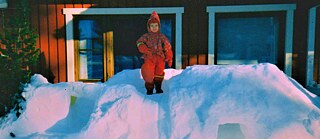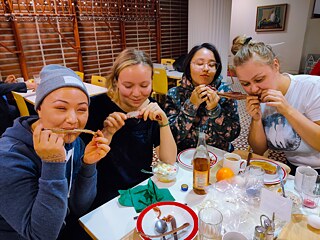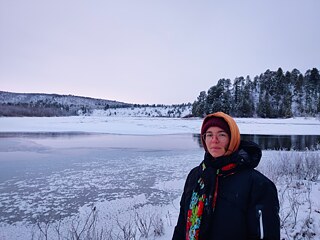Reflecting on the Residency
Greetings from Gáregasnjárga

Residencies are a significant part of The Right to Be Cold*. Here, Sunna Nousuniemi, who hosted resident Marie-Andrée Gill, explains how this experience brought her even closer to their ancestral land.
By Sunna Nousuniemi
When I started writing this text, originally in North Sámi, I got stuck contemplating: how on Earth would I describe „residency“ in Sámi language? I wouldn’t know how to translate the concept, which stems from the western art world. So instead of trying to translate the foreign concept into the Sámi context, I begin to imagine what would be the local, practical and philosophical Sámi starting point for the residency in Gáregasnjárga. Now I shall share my part of the journey with you.
Planting Seeds
July 2018. I’m keeping company to my friend, who’s picking flowers by the Nukkumajoki river in Anár. It’s the hottest summer in a long time. We discuss the state of the world and dream together how to make good things happen in our community. If only there was a place where people could get together and be creative, we yearn. We keep talking, astonished, about the plans to build yet another hotel in our village, even though we already have several hotels, whereas homes for the locals are at scarcity. My friend mentions how she’s already seen this happen before: the appearance of holiday villages in the 90s, the recession, empty and eventually abandoned holiday villages. My friend says it’ll happen again – next time it’s the luxurious hotels left empty.As we continue flower picking I mention my family has an old holiday village on our ancestral lands, but my connection to the place has weakened. My friend gets excited and looks at me waiting for me to come to the realisation. In that moment, a dream came to life which also highlights the core of this story – best epiphanies take place while being on the land together.
Nurturing Our Relations
November 2019. The Goethe-Institut has invited me to discuss The Right to Be Cold* residency project with a group of circumpolar cultural workers, activists, researchers and artists in Helsinki. I accept the invitation and I dial up a local reindeer herder to buy some smoked reindeer ribs to be prepared for this gathering.
But back to my point. In the digital EadnámetMaid, Sámi artivist and duojár Jenni Laiti held a crucial speech about Eallit olmmožin (To live as a human being) and introduced practical tools – one of the approaches being the Sámi concept dikšut oktavuođaid – for finding a meaning amidst all the chaos:
“Collaboration and functional social networks are the terms for coping and persevering, in the past, now and in the future. The recent times I’ve found meaning in taking care of connections, I’ve been nurturing my relations. It’s about giving respect, relations are a responsibility and they are local.”
After hearing Jenni’s speech I felt like they had handed a set of lost keys to me and re-adjusted my thinking, making me wonder when and where did I learn to dream of safety and to practice taking care of relations? My thoughts take me back to my childhood, when my friends and I used to lose ourselves in the dreamlike flow while playing and building all sorts of forts, nests, dens into the forest, between rocks, in the snow, inside the hay and in the water. I still remember how special it was if we found a nest built by someone else – it felt like we had come across something sacred. One time, I got the chance to visit a nest my big brother and his friends had built in our home forest back in their childhood. It was exciting to imagine what they had envisioned with the nest - what were their dreams? Did that place ignite the joyful flow for them where the rest of the world fades away?
Whose dreams are we dreaming now?
Reclaiming Love
As Jenni addressed, one key aspect of Sámi knowledge systems, as well as to decolonisation, is to center building, rebuilding and repairing relationships. Similar themes are discussed on the All My Relations podcast episode “All My Loving Relations”: how for Indigenous people, emphasizing on building up all our human and natural and invisible relations has been vital since time immemorial. However, these pedagogies and ways of life were seized by colonisation which “disrupted our love relationships, it disrupted our cultural memory”, according to one of the podcast hosts, Desi Small Rodriguez, a sociologist and data warrior belonging to Northern Cheynne Nation and Chicana.The quote above helped me to put in words what a residency could possibly be in the Sámi context or at least in my personal context. It’s a space for remembering and reclaiming love, practicing self-governance and establishing fellowships. It’s generational, reciprocal effort tied to the land: my uncle keeps the place alive by simply living in the area, fishing from the river and doing a bunch of other important work in the community. My father writes stories about our relatives and past events in Gáregasnjárga – he also led the massive cleaning operation of the residency space while my uncle’s family and I helped with the cleaning. My little cousin Laura has spent unimaginable hours of reviving the yoiks of our relatives. They, alongside so many, have weaved this community.

Final Words
Since childhood, together with my friends, I have dreamt of, pictured and built our own worlds and realities based on our imagination. Even if it was just a momentarily constructed playful space, like the snow cave which melted away with the spring, those moments held space for alternative realities. I can still feel the warmth of the snow den in which I laid on reindeer skin, star-gazing in the frosty night with a dear friend next to me. Those relatively brief moments will always matter.Tshinashkumitin – giitos eatnat – thank you, Marie-Andrée that I got to strengthen my ties to the ancestral lands with you.
This text piece was inspired by the work and discussions of the following people and collectives:
Piia Kangas
Dáiddadállu Artist Collective – EadnámetMaid 2020
Jenni Laiti – Eallit olmmožin, 2020
All My Relations podcast – All My Loving Relations by Desi Small Rodriguez, Matika Wilbur and Adrienne Keene
Marie-Andrée Gill
Niillasaččat